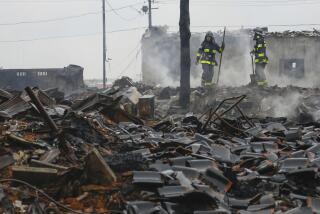New Judge in Place for Hussein’s Trial
- Share via
BAGHDAD — Former President Saddam Hussein’s trial was set to resume under a new chief judge today after the first presiding jurist resigned and his initial replacement was accused of having belonged to the deposed dictator’s Baath Party.
One of Hussein’s lawyers said the defense team would use the turnover in the trial panel’s leadership to accuse Iraqi and U.S. officials of interference and to seek another delay in the proceedings, which have been in recess for a month.
The Iraqi High Tribunal on Monday named Raouf Rasheed Abdel Rahman, a 64-year-old Kurd, to take temporary charge of the five-judge panel. The decision was announced after Judge Rizgar Mohammed Amin, the tribunal’s original chief judge and most public face, resisted appeals by his colleagues and Iraqi leaders to return to the courtroom.
“Everybody is trying to influence my decision, but it is final,” Amin told Reuters news agency Monday.
The chief judge resigned Jan. 9, complaining of government pressure to speed up the trial and clamp down on lengthy outbursts by Hussein and some of the seven other defendants.
Amin’s deputy on the trial panel, Said Hammashi, was chosen by fellow panel members to take over. The tribunal backed down, however, after a government commission set up to purge former Baath Party members from public office objected.
Hammashi denied the commission’s accusation, made in a letter to the court last week, that he had been a party member. Officials first brushed off the letter, saying laws barring former Baathists from government positions did not apply to the tribunal.
But Jaafar Mousawi, the tribunal’s chief prosecutor, said the court decided to pass over Hammashi to avoid further controversy.
Rahman has been serving in a different chamber of the tribunal. His appointment to lead the trial is temporary because Amin’s resignation has not been formally accepted.
Since the start of the proceedings in October, defense lawyers have challenged the legitimacy of the tribunal, which they call a tool of the U.S.-led forces that ousted Hussein in April 2003.
Khamis Ubaidi, one of Hussein’s lawyers, said Monday that the defense would use the conflict over the trial panel’s leadership to seek a postponement.
“The interference is very clear,” he said, adding that Iraqi officials and the court’s U.S. advisors “want a judge who will obey them.”
“It is obvious that the court is under a lot of pressure and this will lead to an unfair trial,” Ubaidi said.
Independent legal observers have voiced concern over the turmoil surrounding the trial, which has previously been delayed by procedural wrangling and the slayings of two defense lawyers.
“The game of musical chairs that is unfolding at the trial is bound to take its toll on local and world opinion about the credibility of the proceedings in Baghdad,” said Michael P. Scharf, a Case Western Reserve University law professor who helped train the tribunal’s officials.
“But the tribunal is far from critically wounded,” he added. “I think it will pull through this latest setback.”
Scharf said Rahman was likely to be more forceful than Amin in conducting the trial “but maybe a little lower-keyed than Judge Hammashi would have been.”
Rahman, a policeman’s son from a well-known Kurdish family, has been a criminal court judge for 10 years. His hometown is Halabja, a Kurdish village where Hussein’s security forces are accused of killing at least 5,000 people in one day in 1988 in a poison gas attack. The massacre is the next of several charges for which Hussein is expected to stand trial.
In the current trial, Hussein and his co-defendants are suspected of summary executions of more than 140 men and boys in the Shiite village of Dujayl as collective punishment for a 1982 assassination attempt there against the then-president.
*
Times staff writers Zainab Hussein, Suhail Ahmad, Raheem Salman and Saif Rasheed contributed to this report.
More to Read
Sign up for Essential California
The most important California stories and recommendations in your inbox every morning.
You may occasionally receive promotional content from the Los Angeles Times.










